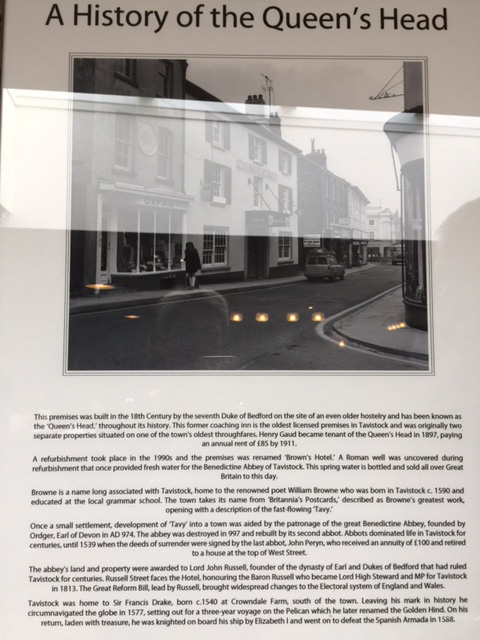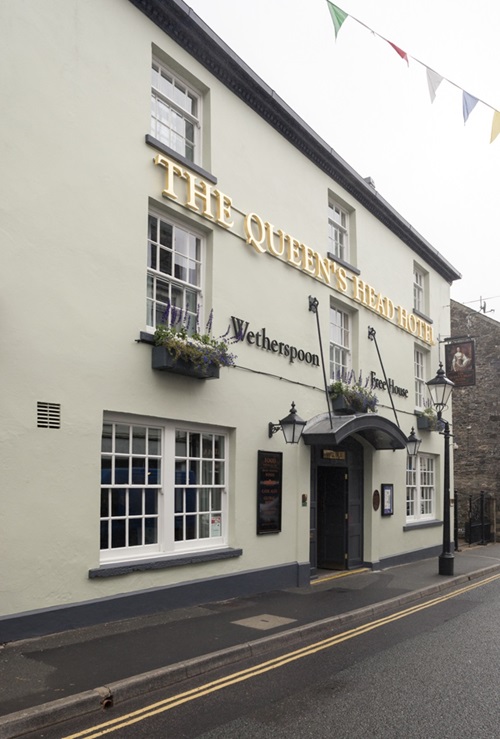This attractive three-storey property is one of several listed buildings on one of Tavistock’s oldest thoroughfares. It was refurbished in the late 1990s, as Brown’s Hotel. During the refurbishment a ‘holy well’ was uncovered which once provided fresh water for Tavistock Abbey. Brown’s Hotel was previously the long-standing Queen’s Head, an old coaching inn with ‘extensive stabling and yards’ at the rear. In the 18th century, the Queen’s Head was one of Tavistock’s many hostelries and, reputedly, on the site of an earlier inn.
A photograph and text about the history of The Queen’s Head.

The text reads: These premises were built in the 18th century by the seventh Duke of Bedford on the site of an even older hostelry and has been known as The Queen’s Head throughout its history. This former coaching inn is the oldest licensed premises in Tavistock and was originally two separate properties situated on one of the town’s oldest thoroughfares. Henry Gaud became tenant of The Queen’s Head in 1897, paying an annual rent of £85 by 1911.
A refurbishment took place in the 1900s and the premises were renamed Brown’s Hotel. A Roman well was uncovered during refurbishment that once provided fresh water for the Benedictine Abbey of Tavistock. This spring water is bottled and sold all over Great Britain to this day.
Browne is a name long associated with Tavistock, home to the renowned poet William Browne who was born in Tavistock, c1590, and educated at the local grammar school. The town takes its name from Britannia’s Postcards, described as Browne’s greatest work, opening with a description of the fast flowing ‘Tavy’.
Once a small settlement, development of Tavy into a town was aided by the patronage of the great Benedictine Abbey, founded by Ordger, Earl of Devon in 974AD. The abbey was destroyed in 997 and rebuilt by its second abbot. Abbots dominated life in Tavistock for centuries, until 1539 when the deeds of surrender were signed by the last abbot, John Peryn, who received an annuity of £100 and retired to a house at the top of West Street.
The abbey’s land and property were awarded to Lord John Russell, founder of the dynasty of Earl and Duke of Bedford that had ruled Tavistock for centuries. Russell Street faces the hotel, honouring the Baron Russell who became Lord High Steward and MP for Tavistock in 1813. The Great Reform Bill, lead by Russell, brought widespread changes to the electoral system of England and Wales.
Tavistock was home to Sir Francis Drake, born c1540 at Crowndale Farm, south of the town. Leaving his mark in history he circumnavigated the globe in 1577, setting out for a three year voyage on the Pelican, which he later renamed the Golden Hind. On his return, laden with treasure, he was knighted on board his ship by Elizabeth I and went on to defeat the Spanish Armada in 1588.
External photograph of the building – main entrance.

If you have information on the history of this pub, then we’d like you to share it with us. Please e-mail all information to: pubhistories@jdwetherspoon.co.uk